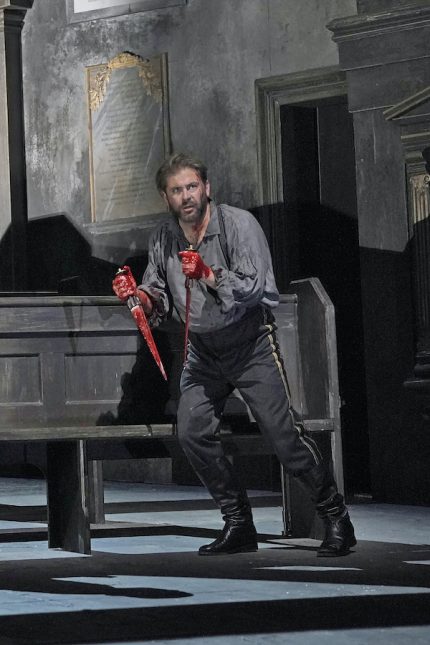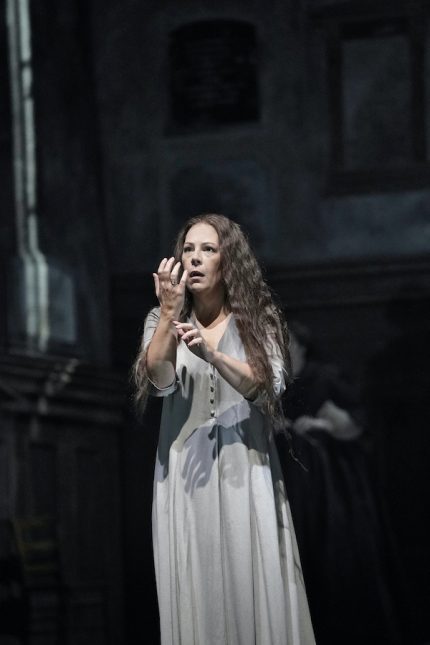After 18-month Covid hiatus, Lyric Opera reopens with a murky, monastic “Macbeth”

The Lyric Opera of Chicago opened its 2021-22 season Friday night with Verdi’s Macbeth, the first live performance on its stage since the Covid-19 pandemic forced the company’s historic closing 18 months ago. (For the record, the last Lyric opera with an audience was Puccini’s Madama Butterfly on March 8, 2020.)
With the pandemic still lingering, there were new health strictures in place for attendees. All patrons had to show a photo ID and proof of vaccination before being admitted. The process was handled efficiently and professionally, at least at the press entrance. Once inside, patrons are required to wear masks at all times, to which nearly all audience members adhered, except those sipping drinks in the lobby before the curtain or at intermission.
Even with the cautious regulations, there was a packed house and a clear sense of occasion. The new seating looked fresh and elegant and CEO, general director and president Anthony Freud and board chair Sylvia Neil welcomed the audience back with fulsome introductory speeches. Freud noted that the reopening marked “the start of a new era for Lyric Opera.”
We live in hope. Yet while there were moments of worthy vocalism on Friday, this new production of Verdi’s Macbeth seemed more like a continuation of the old (recent) era, with the singers having to contend with a problematic staging that too often detracted from their performances. Ultimately, Verdi’s music and the artists won out but it was a tossup as to which would prevail throughout most of the evening.
With Macbeth Verdi began to chart a new course, paring away hoary genre traditions to create works that allied the music more closely to the drama. Macbeth brought a new degree of emotional depth and psychological complexity to opera, qualities that would achieve full fruition in Verdi works to come such as Rigoletto and Otello.
Shakespeare’s tale of the homicidal royal wannabes whose relentless ambition leads to serial murder, insanity and death is set against a bleak backdrop of warring tribes, corrupt, unstable leaders, ceaseless violence and the murder of innocents. You know—kind of like living in present-day Chicago.
The preference of director David McVicar and his scenic designer John Macfarlane for dark and shadowy stagings worked successfully in previous Lyric productions such as the team’s atmospheric Il Trovatore and blood-drenched Elektra.
Unfortunately, such is not the case with their new Macbeth (a coproduction with the Canadian Opera Company). The staging is undone by the sheer visual monotony of the dark, monochrome unit set. Macfarlane offers a crumbling Scottish stone chapel with rows of pews where McVicar places all the action; no castle, no gleaming banquet hall, no blasted heath, no Birnam Wood, no witches’ camp (we do get a cauldron). The director makes a plausible case for this scenic conceit in the program note, but the result is visually stultifying with the relentless gray-green murk making Verdi’s taut 2-1/2 hour opera into a very long evening. David Finn’s lighting was so dark for much of the first act one had to concentrate hard to figure out who and where the singers were.
Further, the set’s practical effect was that the cast had to maneuver awkwardly between the rows of pews that took up much of the center of the stage. And having major characters sing their most crucial arias while seated in the front pew isn’t exactly a riveting visual.
After intermission, the pews were removed and the final two acts provided somewhat more variety of lighting and design; the walls were turned in Act 3 so one is facing the nave rather than the back of the church.
If the scenic design was unhelpful and monotonous, what proved even more fatal was the ham-handed directorial intrusion into the narrative.
McVicar is quoted in the program as saying that he believes the Macbeths’ lust for power stems from their not having children. So, to represent this dubious proposition, the director inserts a trio of creepy children, who prominently surround the stage action. The (unnamed) child extras are on stage almost constantly—pointing knives menacingly, playing games with the Macbeths and even presenting the couple with a bloody fetus and child’s coffin—unnecessary distractions that consistently diluted the drama and upstaged the principals. McVicar even has the annoying brats centerstage, pushing Macbeth and Lady Macbeth into the background during their most important arias. By the end of Act 1, one was ready for Macbeth to dispatch the urchins with his sword.
Craig Colclough is the third singer Lyric Opera booked for the title role after both Luca Salsi and Roman Burdenko each cancelled for “personal reasons.” Colclough’s bass-baritone is not a thing of tonal beauty—burly and somewhat raw of tone, lacking ballast at the bottom. He also sounded underpowered for this part, pushing his voice hard at dramatic climaxes.
Yet give the singer credit for giving his all dramatically, for which he deserved more than the polite applause he garnered at his curtain call opening night. Colclough brought complete commitment to the role of the homicidal Macbeth, notably so in his searing intensity at the banquet where Macbeth is menaced by Banquo’s spectre. The singer also made manifest Macbeth’s fitful pangs of conscience—as much as McVicar’s distractions allowed—and was at his finest in “Pieta, rispetto” as Macbeth ponders a bleak and bitter old age due to his evil actions.

Even more than usual, the evening was dominated by the Lady Macbeth of Sondra Radvanovsky who gave this wayward production its finest vocal moments. One of our leading singing actresses, she delivered a wholly compelling characterization, charting Lady Macbeth’s fall from imperious throne pretender to homicidal co-conspirator and, finally, compulsive, hand-washing basket case. Radvanovsky’s voice remains largely in fine estate. The Sleepwalking Scene was shaky opening night yet the soprano displayed chest-voice depth in “La luce langue,” threw out reams of rich Verdian tone at high points and soared over the massed ensembles in thrilling fashion.
The ever-reliable Christian Van Horn was a distinguished and sonorous Banquo. The bass-baritone’s rendering of the fate-laden “Come dal ciel precipita” was rich in foreboding and beautifully sung.
As Macbeth’s nemesis Macduff— here a kind of conflicted anti-hero—tenor Joshua Guerrero received the most enthusiastic ovation of the evening in his Lyric Opera debut. The Las Vegas native showed real Italianate squillo in his sole aria (“Ahi la paterno mano!”) lamenting Macbeth’s murder of his family.
Matthew Vickers displayed a ringing tenor in his company debut as Malcolm. Ryan Opera Center members Anthony Reed, Maria Novella Malfatti and Denis Velez were effective as the trio of Apparitions. Michael Black’s chorus members served up responsive, often sumptuous ensemble singing, a few ragged entrances apart.
The unison knee- and chest-slapping of the witches/churchwomen in the opening scene was jaw-dropping in its inanity. Even with the ballet excised, McVicar’s ineradicable colleague Andrew George managed to maintain his title as the worst choreographer in captivity.
Moritz Junge’s historically inscrutable costuming was an eclectic but largely effective mix, veering from Puritan church dress to Napoleonic military uniforms. The lively and realistic swordplay in the final act ignited sparks, handled expertly by fight director Nick Sandys.
There was some fitful lack of synchronization between the pit and the singers early on opening night. But in his belated debut as music director, Enrique Mazzola provided a worthy advocate of Verdi’s roiling score. The crucial dramatic moments went with striking intensity and the big act-ending ensembles were exhilarating in their sonic impact and tonal resplendence.
Macbeth runs through October 9. lyricopera.org
Posted in Performances



Posted Sep 19, 2021 at 2:24 pm by V C T
I agree the staging was really bad, as there was no place for movement with all the damn pews. But the direction of the actors was better than the last one from 2010 or so. Lady Macbeth especially.
But they have to put some more lights on. I couldn’t figure out the characters? They all looked the same?!?
Posted Sep 20, 2021 at 9:06 am by Bob Chirinko
Ditto VCT’s comment about the lack of lights. rsc
Posted Sep 21, 2021 at 3:05 pm by Philip Kraus
Another in too many examples of an ego-driven stage director trying to put his unwanted stamp on a great work of art, and crushing it into an unfathomable mess.
I hope in vain that opera companies will get smart and put these misguided directors out to pasture.
Posted Oct 11, 2021 at 7:36 pm by SR
Agree that it was dark, darker, and darkest. Not enough difference between the scenes, so the contrast between the banquet scene and the military scenes was obliterated. Hard to tell who was who and who was singing. And the Birnam wood? Why on earth omit that?